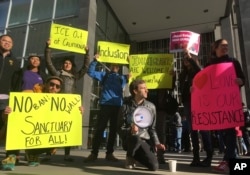A federal judge in San Francisco says he is likely to uphold his earlier court order that blocks the Trump administration from withholding federal funds from so-called “sanctuary” cities, those cities that fail to cooperate with stepped-up enforcement of U.S. immigration law.
On April 25, Judge William Orrick III temporarily blocked the administration order to withhold the federal grants, in response to a lawsuit filed by San Francisco and Santa Clara County. Wednesday, a Trump administration lawyer asked him to reconsider, but Orrick said he is “very much inclined” to leave the injunction in place.
The judge had earlier said the Trump order, signed Jan. 25, was written so broadly that it affects all federal grants and that a narrowed interpretation offered by the Department of Justice does not change the wording of the order that puts at risk hundreds of millions of dollars owed to cities and counties. He said the president cannot impose new conditions on grants approved by Congress.
Immigration enforcement is a federal prerogative, but the administration says it requires local cooperation and that deporting dangerous criminal immigrants is a matter of public safety.
Sessions cites higher violent crime rate
U.S. Attorney General Jeff Sessions, speaking in Las Vegas Wednesday, said the United States has seen a spike in violent crime in the past two years, after decades of falling crime rates. He cited the Salvadoran gang MS-13 as one of the reasons, and said that sanctuary cities like San Francisco offer criminal immigrants safe haven.
Both Trump and Sessions have pointed to a woman named Kate Steinle who was shot and killed in San Francisco by an illegal immigrant two years ago. The man had been convicted of seven felonies and deported five times. Both officials also point to a Los Angeles student named Jamiel Shaw II, who was killed in 2008 by an undocumented immigrant with a violent criminal record.
Scores of U.S. cities, including San Francisco, Chicago, Houston and New York, call themselves “sanctuary” cities and limit information-sharing with U.S. officials on the immigration status of residents, except when it is required by federal law. Sessions said Wednesday that 300 jurisdictions are not sharing information on the immigration status of those arrested or in detention.
Detainers
The dispute also revolves around federal immigration “detainer” requests that local authorities hold undocumented immigrants for 48 hours after they would otherwise be released from custody. San Francisco attorneys have argued that the detainers are voluntary and say they hamper cooperation between residents and police.
San Francisco and Santa Clara County say the Trump executive order would harm essential services, such as health care and emergency response. Santa Clara County officials say they receive $1.7 billion a year in federal and federally dependent funds, much of it channeled through the California state government. San Francisco, which is jointly administered as a city and county, receives $1.2 billion a year in federal funding, or 13 percent of its budget.
Santa Clara County has asked to be reimbursed for the added cost of the added detention, which U.S. authorities have refused, and the county says enforcement of detainers leave the county liable to lawsuits because some courts have judged the immigration detentions unconstitutional. In June, San Francisco agreed to pay a $190,000 settlement to an undocumented migrant from El Salvador who was handed over to federal officials in violation of the city’s sanctuary law after he reported his car stolen.
Many states cooperate
Many other jurisdictions voluntarily share information with immigration authorities. Arizona passed a law in 2010 that requires its law enforcement officers to determine the legal status of people they stopped for other reasons who are suspected of being in the United States illegally. In May, Texas Governor Greg Abbott signed a bill that bans sanctuary cities, which a number of Texas cities are challenging in court.
Poll results released in February by the publication The Hill found that 80 percent of Americans oppose sanctuary cities, but nearly as many want to see comprehensive immigration reform.
The Trump order to bar funding to sanctuary cities is one of three executive orders that have been temporarily blocked or rolled back by the courts. This may be a pattern, said Jean Reisz, a teaching fellow in immigration law at the University of Southern California. She notes that Trump’s earlier orders banning travel of people from a number of Muslim-majority countries faced legal challenges and were temporarily blocked and then scaled back.
The California case continues, and administration officials have said they will prevail if the case reaches the U.S. Supreme Court.





